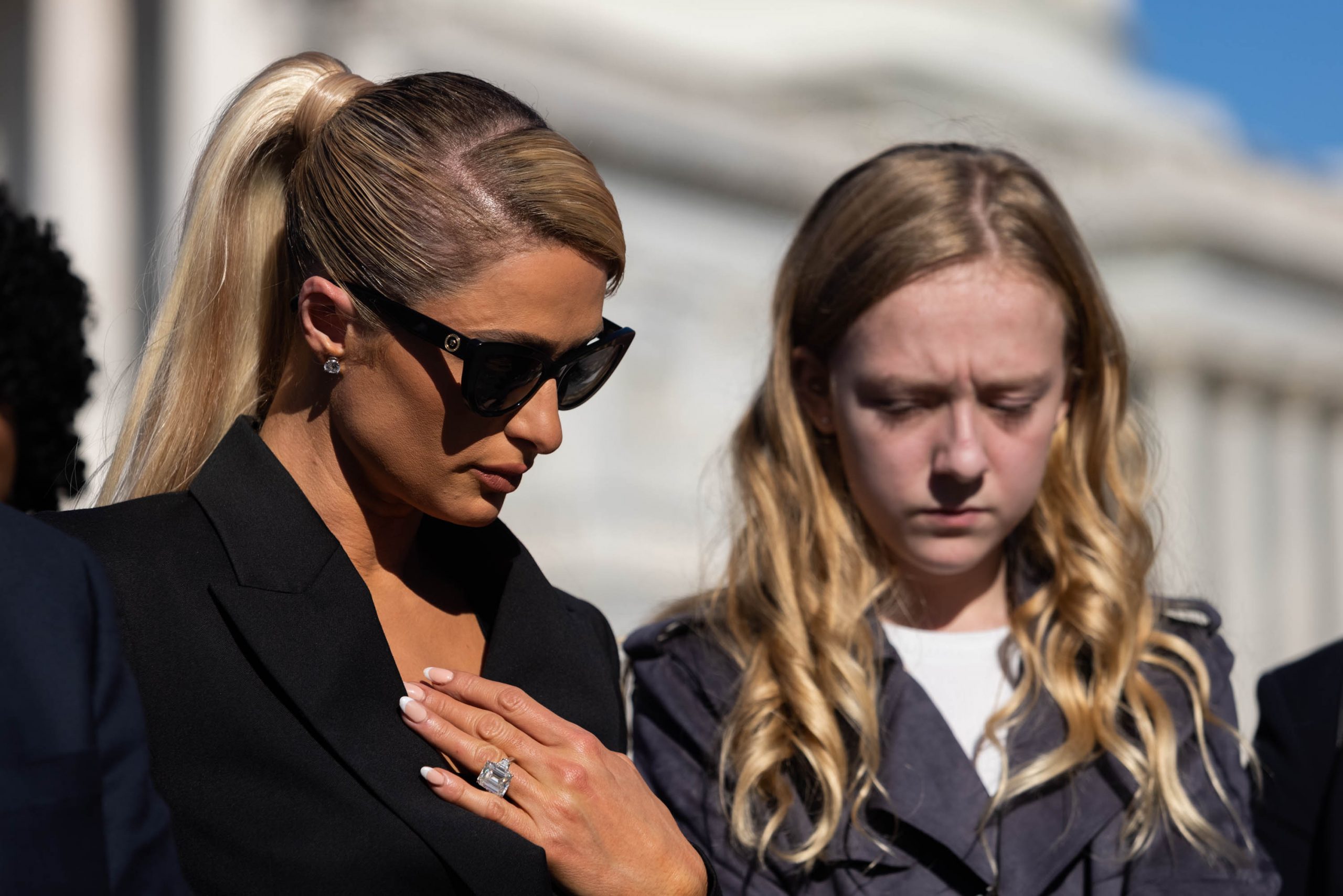
Paris Hilton recalled suffering years of abuse as a teenager as she lobbied for legislation to address the “troubled teen industry,” urging lawmakers to pass legislation to rein in treatment centers that abuse children under the guise of imposing “tough love” to discipline unruly children.
“My parents were promised the tough love would fix me and that sending me across the country was the only way,” Hilton said at a press conference with lawmakers and advocates at the Capitol on Wednesday.
“I was strangled, slapped across the face, watched in the shower by male staff, called vulgar names, forced to take medication without a diagnosis, not given proper education, thrown into solitary confinement in a room covered in scratch marks and smeared in blood,” she said of her experience at Provo Canyon School in Utah.
The model and actress appeared at a press conference alongside Democratic Reps. Ro Khanna and Adam Schiff of California and Rosa DeLauro of Connecticut, plus Oregon Sen. Jeff Merkley, to raise the alarm about the congregate-care facilities that have 24-hour supervision of children and announce federal legislation to address it.
REP. NANCY MACE ON THE ‘FREE BRITNEY ACT’ INTRODUCED IN CONGRESS
Lawmakers will introduce the Accountability for Congregate Care Act, which will create a commission in the Department of Justice to research and establish best practices for facilities for teenagers and establish oversight and accountability. It would also provide grants to states to improve such facilities.
Hilton, now 40, revealed last year in the documentary This is Paris that she suffered daily abuse at treatment centers for troubled teenagers that her parents sent her to after she rebelled by sneaking out of the house and going to parties.
She since has testified in front of Utah state lawmakers about the abuse she endured at Provo Canyon School, a treatment center she lived in that has been accused of drugging and sexually abusing those staying there. The Utah State Legislature passed a bill this year requiring more regulation of the programs.
Now, Hilton is turning to the federal level, calling for a “bill of rights” for the children in such facilities, which would prevent solitary confinement or physical or chemical restraints.

Hilton, wearing a black suit and dark sunglasses and with her hair up in a sleek ponytail, at times appeared shaken as she recalled the abuse she endured.
“One night, when I was 16 years old, I woke up to two large men entering my bedroom, asking me if I wanted to go the easy way or the hard way,” Hilton said. “Thinking I was being kidnapped, I screamed for my parents. As I was being visibly dragged out of my house, I saw them crying in the hallway. They didn’t come to my rescue that night. This was my introduction to the troubled teen industry.”
At the Utah school, Hilton said, she was given clothes tagged with the number 112 and was forced to stay indoors for 11 months straight. Children were regularly thrown into walls and sexually abused, she said.
The problems, Hilton and other advocates at the press conference said, are not isolated incidents but common across the country.
Last year, a 16-year-old in a Michigan foster care facility died two days after staff forcefully held him down because he threw a sandwich in the cafeteria.
While Hilton, an heiress who became famous with a spoiled wild child persona in The Simple Life reality series in 2001, has brought attention to the congregate-care facilities, the youth who are most often in those facilities usually come from much more dire backgrounds.
A 12-year-old girl named Uvea, who is in foster care, recalled being grabbed, thrown to the concrete floor, and put in a headlock when she was 9 years old while she was at a Montana facility that she was sent to because of emotional problems.
“The moment I walked into the facility, I knew it wasn’t a home,” she said. “I was physically abused numerous times.”
“Another time, a staff member put my arms into a restraint, pulled me onto her lap, and then, she yelled at me and called me a pervert,” a visibly emotional Uvea recalled. “When I was on suicide precautions, male or female staff would watch me in the shower and made me feel really uncomfortable.”
Her story was instrumental in ending Oregon’s practice of sending youth in foster care to for-profit congregate-care facilities out of state.
CLICK HERE TO READ MORE FROM THE WASHINGTON EXAMINER
But the lack of federal oversight means there is not a clear picture of how many children die or are abused in congregate-care facilities. Schiff said that between 2000 and 2015, more than 80 children died in such facilities.
No Republicans have signed on to the bill, but Khanna told reporters that Nebraska Republican Rep. Don Bacon and his staff have been “very engaged and thoughtful” in conversations about the bill.

